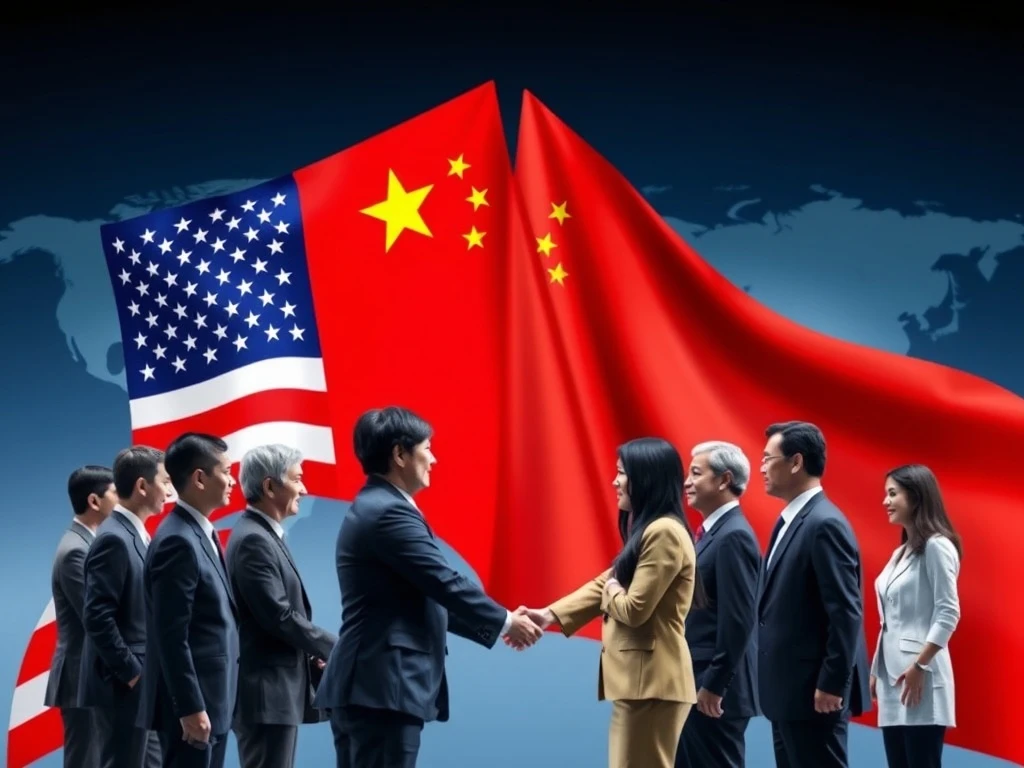Crucial US-China Trade Talks: Business Delegation Paves Way for Economic Stability

In the dynamic world of global finance, events far removed from direct crypto transactions can still send ripples through the digital asset landscape. The ongoing high-level US-China trade talks, coupled with a significant US business delegation China, are prime examples of such macro-economic forces at play. For those invested in cryptocurrencies, understanding these broader shifts in economic relations is crucial. Global stability and reduced trade tensions often foster an environment of greater confidence in traditional markets, which can indirectly influence the flow of capital into and out of risk assets like cryptocurrencies. When major economies like the US and China find common ground, it typically signals a more predictable global economic outlook, potentially leading to increased liquidity and investment across all sectors, including the digital one.
Pivotal US-China Trade Talks Underway
The global stage is currently witnessing a dual-track approach to resolving long-standing trade disputes between the United States and China. On one hand, high-level diplomatic negotiations are unfolding in Stockholm, Sweden, from July 27 to 30. These talks involve senior officials, including Chinese Vice Premier He Lifeng, and are primarily focused on addressing contentious issues such as tariffs, structural trade imbalances, and the potential for future leadership summits. These official discussions represent a direct governmental effort to de-escalate trade tensions that have persisted for years.
Concurrently, a significant US business delegation China is on the ground, engaging directly with Chinese counterparts in Beijing and Shanghai. This delegation, organized by the U.S.-China Business Council (USCBC) and led by FedEx CEO Rajesh Subramaniam, includes executives from major American corporations like Boeing. This parallel engagement underscores a strategic shift: recognizing that economic diplomacy requires not only government-to-government dialogue but also robust private sector involvement. The presence of such a high-profile business group aims to complement the official negotiations by fostering practical dialogue on easing trade barriers and improving market access for American firms.
Why This Business Delegation to China Matters
This visit marks the highest-level US business delegation to China since the trade disputes significantly escalated under the previous administration. Its importance cannot be overstated. The delegation’s primary objectives are multifaceted:
- Ecosystem Dialogue: To facilitate direct communication between American business leaders and Chinese officials, offering a pragmatic perspective on the challenges and opportunities in the bilateral trade relationship.
- Addressing Trade Barriers: To tackle lingering obstacles such as tariffs on goods and complex regulatory hurdles that have persisted since the 2018-2020 trade war. These barriers have impacted profitability and operational efficiency for many American companies.
- Improving Market Access: A key focus is to advocate for better market access for American firms across various sectors, ensuring a more level playing field and reducing discriminatory practices.
- Building Trust: Beyond specific policy outcomes, the visit aims to rebuild trust and emphasize the mutual benefits of collaboration between the private sectors and governments of both nations.
Analysts suggest that the business community’s proactive involvement reflects a strategic effort to build momentum ahead of potential diplomatic breakthroughs. Their presence signals a collective desire for stability and predictability in global trade, which is particularly vital as both nations navigate economic risks amid ongoing global market volatility.
Navigating Complex Economic Relations
The journey towards stable economic relations between the US and China is fraught with challenges, yet the current efforts signal a significant shift in approach. The emphasis from the US business delegation is on pragmatic cooperation, moving away from the zero-sum dynamics that characterized much of the previous administration’s trade policy. By engaging directly with Chinese officials and business leaders, the US delegation aims to reinforce the idea that mutual gains from trade far outweigh ideological differences or geopolitical rivalries.
However, significant hurdles remain. Unresolved issues over intellectual property protections continue to be a sticking point, as does the integration of certain Chinese tech firms into global markets, which raises concerns about national security and fair competition. The success of these ongoing US-China trade talks and parallel business engagements will largely hinge on the ability of both nations to balance domestic political pressures with the compelling economic incentives of an open and fair trading relationship. The business community’s voice is critical here, advocating for policies that support growth and stability, rather than escalation.
Boosting Market Access and Supply Chain Resilience
A core agenda item for the USCBC group in Beijing and Shanghai is to foster discussions on critical areas such as supply chain resilience, technology collaboration, and, crucially, enhanced market access for American companies. The pandemic highlighted vulnerabilities in global supply chains, prompting a renewed focus on diversification and resilience. Collaborative efforts in this area can benefit both nations by creating more robust and reliable trade networks.
Furthermore, technology collaboration, while sensitive, remains an area of potential mutual benefit. Finding pathways for responsible innovation and exchange, even amidst competition, is vital for global progress. The broader trend of de-escalation in recent months, characterized by reduced rhetoric from both governments and tentative steps toward normalization, provides a more conducive environment for these discussions. The business delegation’s focus on these practical, operational aspects of trade aims to solidify the groundwork laid by diplomatic efforts and ensure that any agreements translate into tangible benefits for businesses operating across borders. This collaborative spirit, if sustained, could significantly ease future trade tensions.
Conclusion
The simultaneous high-level US-China trade talks in Stockholm and the impactful US business delegation China represent a crucial, multi-pronged effort to stabilize one of the world’s most critical bilateral relationships. This dual-track approach, blending official diplomacy with direct private sector engagement, underscores a pragmatic shift towards de-escalation and cooperation. While challenges persist, particularly concerning intellectual property and fair competition, the concerted push for improved economic relations, enhanced market access, and reduced trade tensions offers a beacon of hope for greater global stability. For the cryptocurrency community, a more stable global economic environment, fostered by such diplomatic and business efforts, often translates into increased confidence and potentially more favorable conditions for digital asset growth.
Frequently Asked Questions (FAQs)
1. What is the main purpose of the US business delegation’s visit to China?
The main purpose is to foster dialogue on easing trade tensions, improving market access for American firms, and complementing the high-level diplomatic negotiations happening simultaneously. It aims to address lingering trade barriers and build momentum for better economic relations.
2. Who is leading the US business delegation?
The delegation is led by FedEx CEO Rajesh Subramaniam, who also chairs the board of the U.S.-China Business Council (USCBC). It includes executives from other major corporations like Boeing.
3. How do these US-China trade talks relate to the cryptocurrency market?
While not directly related, a reduction in global trade tensions and improved economic relations between major powers like the US and China can lead to greater stability and confidence in traditional financial markets. This can indirectly influence investor sentiment and capital flows into risk assets, including cryptocurrencies, by creating a more predictable global economic outlook.
4. What are the key issues being discussed in the Stockholm trade talks?
The high-level diplomatic talks in Stockholm are focusing on significant issues such as tariff reductions, structural trade issues, and the potential for future leadership summits between the two nations.
5. What are the primary challenges remaining in US-China economic relations?
Key challenges include unresolved issues over intellectual property protections, persistent regulatory hurdles, and concerns regarding the integration of Chinese tech firms into global markets. Balancing domestic political pressures with economic incentives also remains a significant hurdle.
6. Why is this visit considered significant compared to previous ones?
This marks the highest-level US business delegation to China since the trade disputes significantly escalated under the Donald Trump administration. Its timing, parallel to official diplomatic talks, highlights a strategic, dual-track approach to resolving economic disagreements.









